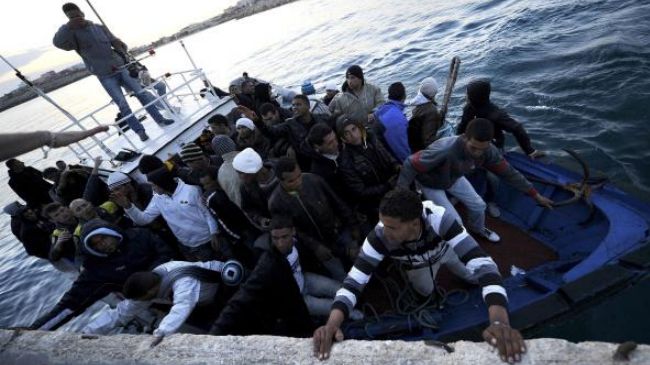The EU’s Jose Manuel Barroso pledged 30 million euros ($41 million) to rebuild Italian refugee centres on Wednesday and Italy promised to boost funding by 210 million euros after a shipwreck tragedy last week in which over 300 refugee
 The EU's Jose Manuel Barroso pledged 30 million euros ($41 million) to rebuild Italian refugee centres on Wednesday and Italy promised to boost funding by 210 million euros after a shipwreck tragedy last week in which over 300 refugees died.
The EU's Jose Manuel Barroso pledged 30 million euros ($41 million) to rebuild Italian refugee centres on Wednesday and Italy promised to boost funding by 210 million euros after a shipwreck tragedy last week in which over 300 refugees died.
The European Commission president was heckled by activists and local residents during his stay on Lampedusa, which is Italy's southernmost island and one of the biggest entry points for irregular migrants into Europe.
"Europe cannot turn away," Barroso said after laying flowers on a child's white coffin in an airport hangar where the bodies of asylum seekers recovered so far are being stored.
Prime Minister Enrico Letta, who accompanied Barroso, knelt by one of the coffins and said Italy would hold a state funeral for the victims.
"This is a European tragedy," said Letta, who also apologised for "failures" by the Italian state in coping with the influx of refugees.
A cabinet meeting in Rome later on Wednesday pledged to increase funding by 190 million euros to cope with the "exceptional influx of foreigners on national territory".
It also boosted funds available for unaccompanied minors by 20 million euros and approved a draft law that would allow refugees longer residence permits in Italy.
The death toll from Thursday's tragedy is now at 302 people -- 210 men, 83 women and nine children.
Dozens more are missing as the boat had an estimated 500 people on board and only 155 survivors were saved.
There was anger on the island, which has been hit by Italy's severe economic crisis and where residents complain they are being left alone to cope with a growing influx of refugees.
"Shame on you!", "Killers!" shouted a small group protesting at the airport as Barroso arrived.
"This is a message for the politicians to stop these tragedies at sea happening again," one man, a local fisherman, told AFP as the sirens on fishing boats were sounded in a gesture of protest.
He added: "We've been living with this for 20 years. We've had enough of death! These deaths are on the conscience of Italian and EU politicians."
In the early hours of Thursday, a 20-metre (66-foot) fishing boat crossing the Mediterranean from Libya with Eritrean and Somali refugees caught fire, capsized and sank within sight of the island.
Some of the survivors said that the fire started when the Tunisian captain, who is now under arrest, set light to a T-shirt to attract coastguards after the boat began taking on water.
Terrified passengers -- many of whom could not swim -- were forced to throw themselves into the dark pre-dawn waters, which were thick with the fuel oil that had spilled out from the vessel.
Divers were still on Wednesday recovering corpses inside the wreckage at a depth of some 50 metres (165 feet) and bringing them to shore in black body bags.
The disaster has shown up the European Union's flawed asylum policy, which has been criticised for forcing refugees to resort to desperate measures to reach Europe.
The European Commission has urged EU states to pledge planes, ships and funds for the budget-cut Frontex border guard service to mount "a big search and rescue" effort across the Mediterranean.
The EU's Home Affairs Commissioner Cecilia Malmstroem, who was visiting with Barroso and Letta, also said rules on asylum could be reformed to make these perilous journeys less likely.
"We do need to open ways for more regular migration," she said, giving as an example the possibility of "humanitarian visas" and requesting asylum outside European Union territory.
"We need to change our policy on immigration. This restrictive approach has shown its limits," she said.
Some 30,000 migrants have landed in Italy this year -- four times more than in 2012 -- many of them are fleeing dictatorship in Eritrea.
Speaking in Geneva on Wednesday, exiled campaigner Tsedal Yohannes said the tragedy off Lampedusa was a result of human rights abuses in Eritrea.
"I appeal to the international community to find a way of putting pressure in order to improve human rights in Eritrea," she said, calling for tough financial sanctions against the country's elite.
"I believe Lampedusa will be a turning point."